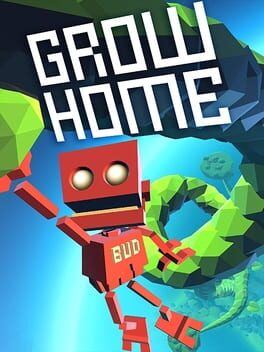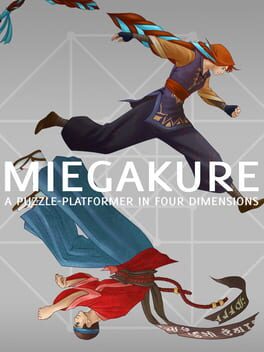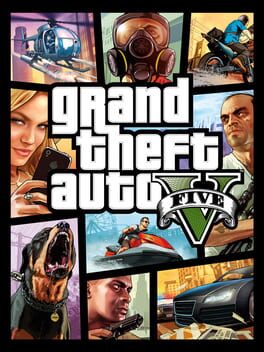none
10 reviews liked by none
Grow Home
2015
Miegakure
TBD
Dark Souls III
2016
Despite all of the love people seem to have for it, I didn't really fall for Dark Souls 3. To begin with, the Clownmaster Orgville fight was dissapointing, and not at all what I was expecting given the leadup in the Hallowed Bastion area. Pretty much none of the levels I explored--not even the Forest of Unkempt Fires--really had that DaS vibe that is so important. Demon Stalker was a fun boss, as was the Moss Valkyrie. And I guess filling the Essence Urn with the spirits of the Big Five was a satisfying goal--still, the final fight against Oversoul Snindermight just lacked something. I wished I was back in Lordran, fighting the first iteration of "cool old timey monster bosses," rather than this later take on it. Something was lost, a spark; the game is hollow and the characters fungible.
El Dorado
TBD
Grand Theft Auto V
2013
If I wanted to watch a bunch of shitty animations stare soulessly at each other while occasionally barking some bare allusion to something that might mean anything I'd just wait a few years until marvel movies are made fully by AI. GTA games really want you to care so badly about the characters, and to look beyond the uncanny valley of their eerie lifelessness.
Thinking that anything this game is funny, entertaining, sad, or impactful in any way is like writing home to your poor mom about how that mechanical rat concert you saw at the Chuck E. Cheese was damn near the best you ever saw; that the singing automaton deeply touched your heartfelt woes and secrets and made you think maybe there's still some hope in this dark world; that you felt like you had never heard Turkey In The Straw until it came out of that dingy old robot's mouth, as you pounded your fourth fifth in that dingy kids arcade...
Thinking that anything this game is funny, entertaining, sad, or impactful in any way is like writing home to your poor mom about how that mechanical rat concert you saw at the Chuck E. Cheese was damn near the best you ever saw; that the singing automaton deeply touched your heartfelt woes and secrets and made you think maybe there's still some hope in this dark world; that you felt like you had never heard Turkey In The Straw until it came out of that dingy old robot's mouth, as you pounded your fourth fifth in that dingy kids arcade...
A Short Hike
2019
Dark Souls II: Scholar of the First Sin is a mod of the 2008 action game Dark Souls, created by the community group known as the Scholar of the First Sin Development Team (SFSDT; previously known as the First Sin Back Room). It is designed to retool Dark Souls to play more like its two predecessors, King's Field (2001) and Demon's Souls (2009), in response to fan objections to Dark Soul's physics, slower-paced gameplay, larger use of chance elements, and mechanics of certain attacks. Dark Souls II: Scholar of the First Sin reintroduces the mechanics like health penalties for being undead, which were present in Demon's Souls but were cut from Dark Souls. In addition, it features a new art style for in-game menus and allows players to choose certain weapons individually when they are only accessible as extensions of other ones in Dark Souls.
Omori
2020
One way to understand OMORI's relation to Yume Nikki, a game from which it lifts a lot, is to imagine a remake of Inland Empire that spends hours of screentime explaining why Laura Dern is so scared.
OMORI exists in the quirky and surreal JRPG lineage of the MOTHER series, LISA, and Undertale (among others). As far as those series' influence goes it does fine: you go on a journey with a bunch of your close friends; the characters are believable and human; the music slaps ass. At the same time, the game is atrociously paced and never seems to fall into any sort of rhythm. It's difficult to get a sense of its scope while playing. But aside from a just ridiculous, immersion breaking, and as far as I can tell unnecessary twist towards the end, OMORI is effective. I certainly cared more for the characters in this game than anybody in Earthbound or Mother 3.
It does well compared to other MOTHERlikes, but how does it stack up to Yume Nikki? Yume Nikki has barely any text. To be frank, it barely has anything. You wander through surreal and sometimes terrifying dreamscapes; you occasionally interact with things that may or may not result in consequences. Still: by exploring the landscapes of her dreams, the player begins to feel a connection to their character (known as Madotskui). You get some vague idea of her fears, her traumas, her general brain state. This is all communicated to the player by, again, functionally being a walking simulator. OMORI seemingly attempts to accomplish a similar goal: putting the player into Sunny's dreamscapes. But it does so by completely eschewing the subtlety that really made Yume Nikki special.
In one of OMORI's final explorations of dream space, he is sent into a room filled with doors. As he enters these doors and explores the rooms contained within, he is given "keys" that he uses to progress. This segment of gameplay seems deliberately designed to echo Yume Nikki, even beyond just borrowing the aesthetics as the rest of the game does. Inside of one room, the player can interact with bells: some of the bells make noises, but the other prompts a textbox, "this bell makes no noise." Why? What is gained by telling the player that? In Yume Nikki, a player understands an object can't be interacted with because an attempt at interaction with it simply yields no result. It's this kind of redundancy that slows OMORI down, and really impacts its effect.
OMORI taken in its worst light seems to stand for the suggestion that Yume Nikki lacked some kind of backstory. We need to understand Sunny's interpersonal friendships and their history, his family life and his interests. More importantly we need to be told about these aspects, and beat over the head with them. I don't think that's true: I think this game could have done more if it had less stuff in it. That being said the game succeeds more than it fails, and its always cool to see surreal dreamlike influence from Yume Nikki leak into mainstream shit. In the end, the degree to which the game pays homage to Yume Nikki just kinda triggers the "never remind the player they could be playing a better game" rule. Which is a shame because again, all told this game ain't bad.
OMORI exists in the quirky and surreal JRPG lineage of the MOTHER series, LISA, and Undertale (among others). As far as those series' influence goes it does fine: you go on a journey with a bunch of your close friends; the characters are believable and human; the music slaps ass. At the same time, the game is atrociously paced and never seems to fall into any sort of rhythm. It's difficult to get a sense of its scope while playing. But aside from a just ridiculous, immersion breaking, and as far as I can tell unnecessary twist towards the end, OMORI is effective. I certainly cared more for the characters in this game than anybody in Earthbound or Mother 3.
It does well compared to other MOTHERlikes, but how does it stack up to Yume Nikki? Yume Nikki has barely any text. To be frank, it barely has anything. You wander through surreal and sometimes terrifying dreamscapes; you occasionally interact with things that may or may not result in consequences. Still: by exploring the landscapes of her dreams, the player begins to feel a connection to their character (known as Madotskui). You get some vague idea of her fears, her traumas, her general brain state. This is all communicated to the player by, again, functionally being a walking simulator. OMORI seemingly attempts to accomplish a similar goal: putting the player into Sunny's dreamscapes. But it does so by completely eschewing the subtlety that really made Yume Nikki special.
In one of OMORI's final explorations of dream space, he is sent into a room filled with doors. As he enters these doors and explores the rooms contained within, he is given "keys" that he uses to progress. This segment of gameplay seems deliberately designed to echo Yume Nikki, even beyond just borrowing the aesthetics as the rest of the game does. Inside of one room, the player can interact with bells: some of the bells make noises, but the other prompts a textbox, "this bell makes no noise." Why? What is gained by telling the player that? In Yume Nikki, a player understands an object can't be interacted with because an attempt at interaction with it simply yields no result. It's this kind of redundancy that slows OMORI down, and really impacts its effect.
OMORI taken in its worst light seems to stand for the suggestion that Yume Nikki lacked some kind of backstory. We need to understand Sunny's interpersonal friendships and their history, his family life and his interests. More importantly we need to be told about these aspects, and beat over the head with them. I don't think that's true: I think this game could have done more if it had less stuff in it. That being said the game succeeds more than it fails, and its always cool to see surreal dreamlike influence from Yume Nikki leak into mainstream shit. In the end, the degree to which the game pays homage to Yume Nikki just kinda triggers the "never remind the player they could be playing a better game" rule. Which is a shame because again, all told this game ain't bad.









